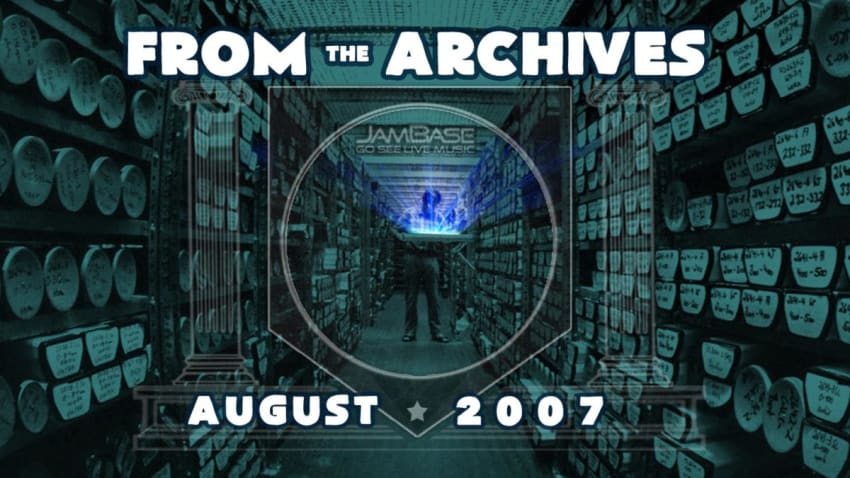Get Lifted With London’s Klaxons
By Team JamBase Aug 7, 2007 • 12:00 am PDT

By: Chris Pacifico
 |
Myths attaches a flux capacitor to the so-called “dance-punk” movement to create blazing, blistering punk-pop that speeds through time and space with crafty hooks, blaring air raid keyboards and techno laced high ends with a mod twist that makes this a cryptic, way out, futuristic scion to XTC’s White Music and The Jam’s In the City. You can mosh to it like early British punks did at Sex Pistols shows, where they flopped around like sizzling bacon and pantomimed ringing fellow concertgoer’s necks or you can dance until your shoe rubber smolders. Either way, Klaxons are something so new and fresh that many have already dubbed them as the patriarchs of what is being called “new-rave”.
 “I find it amusing that we’ve been given the name of some non-existent music genre,” says guitarist-singer Simon Taylor-Davis, who notes that while he and his band mates are influenced by dance music none of them were ravers. “We make psychedelic, subversive pop music that’s quite heavy and made on guitars.”
“I find it amusing that we’ve been given the name of some non-existent music genre,” says guitarist-singer Simon Taylor-Davis, who notes that while he and his band mates are influenced by dance music none of them were ravers. “We make psychedelic, subversive pop music that’s quite heavy and made on guitars.”
The piercing shrieks and trance inducing glitches and bleeps in their music bring to mind the London acid-techno scene of the ’90s, specifically respected DJ-producers like D.A.V.E. the Drummer and Chris Liberator, who almost always used the treasured and out-of-production Roland 303 drum machine. While Klaxons haven’t listened to the abovementioned, Taylor-Davis and company prefer to be frugal in their choice of synthesizers, no matter how big they’ve gotten. “We basically have this really cheap keyboard,” says Taylor-Davis of their Yamaha model keyboard which they put through their “cheap crap” guitar pedals.
 |
Taylor-Davis and Reynolds are Klaxons’ primary songwriters. Reynolds studied philosophy in college and Taylor-Davis art, so it’s easy to hear where they gained their creative impetus and penchant for reverie-based lyrics. “We get off on the fact that we can put certain things in a pop context that shouldn’t be there,” Taylor-Davis makes plain. “Basically we made a fantasy album about nowhere because we wanted to make a record about somewhere that you couldn’t see or touch or have heard of or know about or have an understanding about. So, in opposition to making music about reality we wanted to make an album about unreality and pure fantasy and intertwine that into everything.”
With the recent state of tumult and disillusionment in Great Britain due to terrorism, the economy and other social upheaval, there are listeners who try to decipher whether or not there is any political message in the Klaxons’ music. The lads say they make an effort to steer clear of any political commentary. “When politics and music mix it often becomes an embarrassment and that’s something we wish to avoid,” asserts Reynolds. “We’re a band that bases ourselves on fantasy and not on reality and politics. We’re about escapism and not about trying to think about what’s going on in the world.”
Continue reading for more on Klaxons…
 |
|
However, certain numbers can make one wax theoretical like “Totem On The Timeline,” a mutated Buzzcocks-like barnburner with a fervid chorus that goes:
 |
Lady Diana and Mother Theresa
Signs
You know I see them all the time
Time
Just a fraction of a sign.
Taylor-Davis explains how it details the band’s ultimate dream shindig. “That’s basically a song about a party wish list. There are places in the Mediterranean [i.e. Ibiza] where people between the ages of 18-30 go to get completely out of their minds over the summer periods. These are places where people go and destroy themselves and we found it amusing to want to go to these places and be with these historical characters.” One wonders how a bumping gathering at a club would go down with a kindly woman like Princess Di and Mother Theresa, arguably modern history’s most well known humanitarian figure, sharing the VIP section with a Roman tyrant whose ego was so large that he had himself deified while still alive. But, that’s why they call it fantasy.”
 |
Listeners these days are able to hear about new music from more and more outlets via blogs, online publications and the always-expanding variety of print music periodicals. But, in Great Britain, Taylor-Davis explains, there are a few essential outlets that reign supreme if an artist wants to strike it big. “The thing in the U.K. is that there are basically only a couple of large channels, and if you can win them over – NME [New Musical Express] and [BBC] Radio 1 – then you’ve kind of hit the entire U.K. in one hit”.
 |
Where the American tabloids love to capture whatever skinny they can on the movements of celebs like Angelina Jolie, Jennifer Aniston and Paris Hilton, anybody deemed a public figure in the U.K. is susceptible to tabloid treatments that sully their name. This includes musicians like Klaxons, but Taylor-Davis remains relaxed about it. “We’ve managed to get ourselves a fantastic rise over a very short period of time, and that’s been thanks to the press,” offers Taylor-Davis. “In regards to us being in the tabloids, we’ve been there but there really hasn’t been anything sensational that they’ve been able to pick up on us. We haven’t really gotten to the tabloid fodder level yet but there is definitely a hint of it around the corner.”
JamBase | United Kingdom
Go See Live Music!
